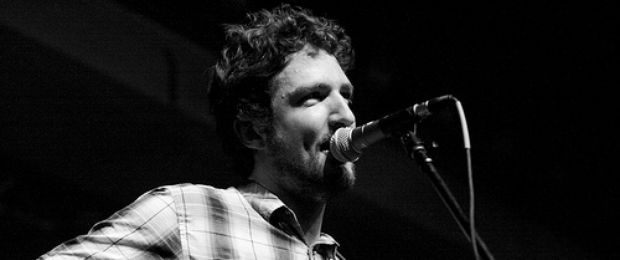Talk to Frank
It’s 5.30pm and doors are in just under two hours. We are sat in Tammy Wynette’s old trailer (if you don’t know, look her up!) which now has pride of place in the bizarre backstage of The Assembly. Someone is cooking a fry-up and there is a techie duelling a motorized dalek. It’s all pretty surreal.
We are grinning like two cats inundated with cream when Frank walks in. For a man who tours most nights each year, he doesn’t look particularly tired or world-weary. All in all, he’s pretty laid back. We exchange pleasantries and get talking about Leamington Spa. “What do you think of the … er … bustling metropolis?”. Not the best opener, but enough to set Frank off on a roll for twenty minutes – and the man can talk. He has never been before which is unusual, “given how much we’ve toured … but it’s important that we keep coming to new places, even smaller ones”. We ask whether he prefers playing these sort of intimate venues, reminiscent of his earlier gigs – as opposed to say, Wembley. “It’s good to have a mix”, he tells us.
Over the past couple of years, Frank’s career has gone from strength to strength. He has sold out Wembley Arena and played to a television audience of a billion at the Olympics opening ceremony. The crowds he draws, however, are still pretty diverse. “It’s great, we get old people, young people …”. We interject – both our families are attending the gig. Frank lights up, “That’s fantastic!” Have the crowds changed at all? “I may have lost a few of the scene kids that don’t come anymore because I’m too popular or whatever.” Frank shrugs. A price worth paying perhaps.
We get talking about his time as a student. He studied History at LSE. “I love the subject and there are a lot historical references in my lyrics. I wasn’t at uni much though, always touring with Million Dead [his former punk outfit]. I’d get a call and be asked ‘Where were you Tuesday?’ and I’d reply, ‘Belgium’.”
Steering the conversation back to the present day, we get chatting about Frank’s most recent solo album, England Keep My Bones. The tracks make it clear that his national identity is important to him. But he stops us when we describe it as a ‘patriotic’ album. “I don’t think England is better than anywhere else”, he says. Playing international gigs just reminds him what he loves about the country he grew up in. The best thing about about England? He hesitates and then grins, “Greasy spoon cafés”.
Being big fans ourselves, we are keen to hear about the new album (out in March). He talks about it openly and candidly, expressing worries about that awkward album stage – having done three, he says, musicians often have a lapse – and this will be his fifth. “You get comfortable and that’s how artists like U2 – and don’t get me wrong, I’m saying this as a U2 fan – can go from make a song like Sunday Bloody Sunday and then years later, make a song where the chorus is ‘Yeah, yeah, yeah, yeah’.” To get past this this, Frank says he’s decided to push himself, producing a “raw and uncomfortable” album. “Art should be uncomfortable”, he tells us.
The subject of England has been put to bed. It’s back to basics. “I wanted to write it as if I were just a kid in my bedroom – I’m not thinking about a worldwide audience or whatever.” He likens the new record to, “A whiskey. At 3am. Full of tears.” Much of it centres around a break-up – something that Frank is still clearly a little shaken up by. A cheery one then? Frank laughs. It’s clear his success hasn’t gone to his head.
Frank is witty, articulate and increasingly popular. It’s no wonder so many people want to see him as something of a political figure. Last year he was subject to what he describes as a “pretty nasty witch hunt” for some disparaging comments he made about the left – which many assumed he would associate himself with. We tentatively ask him about his (regularly criticised) libertarian politics. “To some extent, when you become a ‘public figure’ you expect to be asked about this stuff. I’m getting thicker skin … but after a while I just can’t be fucked to keep defending and explaining myself.”
We press for his views on the coalition government. He isn’t keen to compare them to the New Labour regime, either favourably or unfavourably. He does say, “I spread my hate equally between the Conservatives and the Lib-Dems. I was never one of these people who liked the Lib-Dems before the coalition. They once proposed a register of journalists … they’re a thoroughly illiberal party.” This is a man who hated Nick Clegg before it was cool.
We bring the interview to a close, He and his music have come a long way, but it’s clear he still loves being on the road. “I’ll slow down a bit at Christmas”, he tells us. “It’s a time when I can remind my family what my face looks like.” Students can relate.

Comments (1)